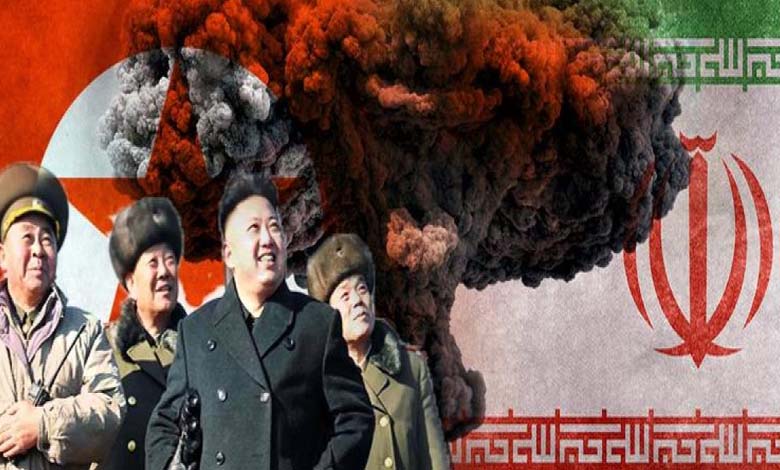Post-Iran Strike Scenario: What Comes Next for the U.S. and North Korea?

North Korea views the recent U.S. strike on Iran as a “preemptive military threat” and is likely to ramp up its own defensive capabilities in response.
That’s the conclusion of a CNN analysis examining the aftermath of the American airstrikes on Iran’s nuclear infrastructure—and the possible consequences for another nation whose nuclear and missile programs have long drawn global concern.
-
Sanctions on Iran and Aid to Israel… “American Representatives Swim Against the Biden Current”
-
Sources Reveal Shocking Pentagon Intelligence Report on Iran’s Nuclear Program
Experts warn that Washington’s military actions could motivate Pyongyang to accelerate its weapons programs and strengthen ties with Russia. They may also reinforce Kim Jong-un’s belief that nuclear arms are the ultimate deterrent against U.S.-driven regime change.
Despite years of diplomatic efforts to convince North Korea to denuclearize, it is widely believed that Pyongyang already possesses several nuclear warheads and missiles capable of reaching the United States. Any military strike in the Korean peninsula would thus carry far more serious risks.
Lim Eul-chul, professor of North Korean studies at South Korea’s Kyungnam University, stated: “There’s no doubt Trump’s strike on Iran’s nuclear sites will reinforce North Korea’s long-held policy of regime survival through nuclear armament.”
He added: “North Korea sees the U.S. airstrike as a preemptive threat and will likely hasten its efforts to strengthen its ability to carry out preemptive nuclear strikes.”
-
Behind Trump’s Deal: How Iran and Israel Agreed to End the War
-
Iran’s Nuclear Program Under the Midnight Hammer
Russia’s Growing Role
Analysts say this acceleration could be facilitated by Russia, thanks to the deepening military cooperation between the two countries following the war in Ukraine.
Since their formal alliance in 2024, the strategic partnership between North Korea and Russia has become a vital economic and military lifeline for Pyongyang amid ongoing Western sanctions.
“Based on this alliance,” said Lim, “North Korea will likely move toward joint weapons development, shared military drills, technology transfers, and increased interdependence—economically and militarily.”
-
B-2 Over Iran: Pilot Comfort Was Part of the Strike Plan
-
Trump Does Not Rule Out Working Toward Regime Change in Iran
According to Western reports, North Korea has sent over 14,000 troops and millions of munitions—including missiles and artillery—to aid Russia in Ukraine.
In return, Russia has supplied Pyongyang with critical military equipment, including air defense systems, anti-aircraft missiles, electronic warfare gear, and refined petroleum products.
These supplies allow North Korea to finance its military programs, continue developing its banned ballistic missiles, and gain direct experience in modern warfare.
-
Mutual escalation between Iran and Israel despite calls for de-escalation
-
Israel-Iran War Enters Second Week: Firepower Overtakes Dialogue
Lessons from the Iran Strike
Victor Cha, head of the Korea program at the Center for Strategic and International Studies, argued that the U.S. strike on Iran fits a troubling pattern in Kim’s eyes: “Countries without nuclear weapons—from Iraq to Libya to Iran—remain vulnerable to U.S.-led interventions.”
He warned that the Iran operation will likely leave a lasting impression on Pyongyang: “For North Korea, the strikes validate two things: first, the U.S. won’t use force against its nuclear program the same way it did with Iran. Second, nuclear deterrence is essential and must be preserved.”
-
US Strike on Iran Closer Than Ever
-
Iran Tests Trump’s Principles—Will He Fall Into the Trap His Predecessors Warned Against?
A Stark Contrast
According to Liv Erik Easley, professor of international security at Ewha Womans University in Seoul, “North Korea’s nuclear program is far more advanced, with possible warheads ready to launch via various delivery systems, including ICBMs.”
“Kim’s regime can threaten the U.S. mainland,” he said, “and Seoul remains within striking range of many North Korean weapons.”
-
Iran’s Fordow… a secret beneath the mountain impervious even to the most powerful bombs
-
As if the world forgot us: Gaza fears its tragedy is being buried under Iran-Israel conflict
Iran, by contrast, has yet to develop a deployable nuclear weapon. According to the IAEA’s latest assessment, its uranium enrichment remains below weapons-grade. Tehran also spent years negotiating with Western powers on its nuclear program.
Estimates suggest North Korea holds between 40 and 50 nuclear warheads, along with the ability to launch them across the region and potentially to the continental U.S.
Lim warned that “any attack on North Korea could trigger a full-scale nuclear conflict.”












